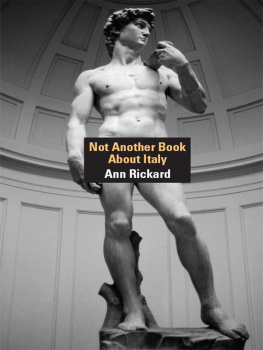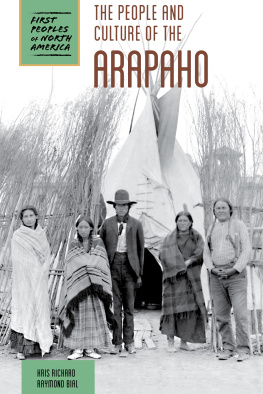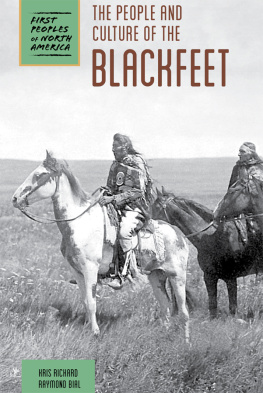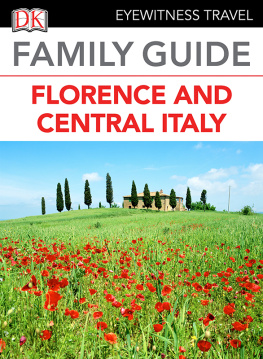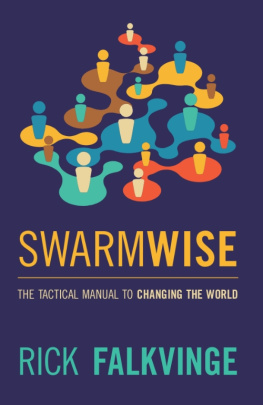Ann Rickard - Not Another Book About Italy
Here you can read online Ann Rickard - Not Another Book About Italy full text of the book (entire story) in english for free. Download pdf and epub, get meaning, cover and reviews about this ebook. year: 2010, publisher: New Holland Publishers (Australia) Pty Ltd, genre: Home and family. Description of the work, (preface) as well as reviews are available. Best literature library LitArk.com created for fans of good reading and offers a wide selection of genres:
Romance novel
Science fiction
Adventure
Detective
Science
History
Home and family
Prose
Art
Politics
Computer
Non-fiction
Religion
Business
Children
Humor
Choose a favorite category and find really read worthwhile books. Enjoy immersion in the world of imagination, feel the emotions of the characters or learn something new for yourself, make an fascinating discovery.
- Book:Not Another Book About Italy
- Author:
- Publisher:New Holland Publishers (Australia) Pty Ltd
- Genre:
- Year:2010
- Rating:4 / 5
- Favourites:Add to favourites
- Your mark:
- 80
- 1
- 2
- 3
- 4
- 5
Not Another Book About Italy: summary, description and annotation
We offer to read an annotation, description, summary or preface (depends on what the author of the book "Not Another Book About Italy" wrote himself). If you haven't found the necessary information about the book — write in the comments, we will try to find it.
Not Another Book About Italy — read online for free the complete book (whole text) full work
Below is the text of the book, divided by pages. System saving the place of the last page read, allows you to conveniently read the book "Not Another Book About Italy" online for free, without having to search again every time where you left off. Put a bookmark, and you can go to the page where you finished reading at any time.
Font size:
Interval:
Bookmark:
About Italy

About Italy

There really isnt a need for another book about Italy. We all know that. Look on the shelves in any travel section of any bookstore and youll see more than enough books written about Italy. Beautiful books by erudite people whove bought old, uninhabitable Tuscan/ Umbrian/Ligurian farmhouses and restored them into comfortable dwellings of infinite charm. These clever people seem to undertake this restoration with a minimum of fuss, all the while forming lifelong friendships with tight-knit locals and discovering a host of hidden talents including olive tree pruning and fresh pear preserving.
Id love to write such a book, a lovely tome filled with pages of evocative prose about fields of dancing sunflowers and groves of shimmering olive trees. Id love to tell you about the simple joy of erecting a table under a giant fig tree after a rewarding day spent sanding old ceiling beams and discovering beautiful frescoes beneath years of mould on thick dining room walls. Id introduce you to my new best friends from the village down the road, who join me at my table where we chargrill locally made sausages skewered with sprigs of rosemary (from my lovingly tended herb garden) over an open fire while drinking my self-bottled wine. At the end of our meal, we would reach up to pluck a perfectly ripe fig to serve with a chunk of gorgonzola and then talk on and on into the warm Tuscan night. And Id have every paragraph punctuated with charming italicised Italian words and names.
At the panetteria in the piazza we pause during our passeggiata to greet Luigi and Mariuccia and, after many enthusiastic ciao s (for we now know them well enough to use the more intimate form of greeting rather than the formal buon giorno ), we buy some freshly baked panini to eat with the porchetta slowly roasting at home in the old wooden oven we resurrected from its grave beneath the olive nets in the storage shed at the bottom of our property
That really is how Id like to write. But I have not lived in Tuscany/Umbria/Liguria for any length of time, let alone restored an old house or bonded with the local signoras or bottled pears.
As you will have noticedbeing discerning readers (you must be, you bought this book)you really do have to go and live in Italy and restore an old farmhouse before you can write dreamy prose with sexy Italian words in italics. There is absolutely no getting away with making things up; even an amateur would instantly pick up my mistakes I believe you do not take a passeggiata in the morning, which is when you would in fact be buying panini and saying buon giorno . A passeggiata is an evening stroll, the time when Italians don their good gear and go out into the streets to lick gelati , walk up and down, be seen and admired, stop to talk with friends and, in the case of the younger generation, flirt big-time.
So, having brought the italic thing to your attention right up frontand I am happy to say that you will be treated to many more italicised words throughout this booklet me say that I do have something to write about Italy and all its charms, frustrations and complexities. Probably nothing new, but maybe in a different way, a way that might connect with you and take you on a little Italian holiday, detouring just for a short while across the northern border into Switzerland.
But first, because I am a woman of a certain age, a small indulgence if you dont mind. Let me take a shuffle down memory lane to 1966 when I first met Italy, a time when the miniskirt was the height of fashion and I was twenty years old and owned a pair of legs that went all the way from Melbourne to Cairns (or London to Glasgow, depending on where you are reading this).
Back then, Naples was the first Italian city I visited. Not the best place to greet Italy, but there was no choice; it was the first European port of call the Italian ship made on its way from Melbourne to Southampton.
Like many young Australian women of the time, I was on my way to London to do the working holiday thing. I am in fact an English personI was born there and my parents immigrated to Australia when I was about ten, but I have always felt a strong connection with my country of birthand I wanted to return to work and live in lovely London and explore exciting Europe. Ships were the favoured form of travel then (a flight from Australia to England cost about the same as a small house) and if it took six weeks to get there, all the bettera holiday en route to the working holiday was all part of the experience.
An old Australian television documentary entitled On Being a Sheila was recently re-aired and it revealed, among many enlightening snippets, that in 1965 (I know its a year before Im talking about, but lets not be pedantic) the average Aussie sheila was expected to be a virgin when she married at the perfect age of twenty-four, and that tens of thousands of us sailed off on ships to go and work in London. Tens of thousands!
Our blokes would come to see us off and sit around on the decks before the ship set sail. They would drink from beer cans and mutter romantic farewells between swigs. Down the hatch, theyd fondly say. Or, more meaningfully, Dont do anything I wouldnt do. And, even better, Watch out for those continental blokes. And watch out for them we did. From the very moment the ship left the wharf.
An Italian ship full of suave and randy Italian officers gave us an exciting and comprehensive introduction to the ways of Italians. Admittedly, it was only the ways of gold-braided, white-uniformed, worldly Italian men; men who had nothing on their minds except bedding every one of those tens of thousands of Australian girls. But, in 1966 to most Australian girls who had never been in the company of elegant men, they were thrilling ways. Sex was the only thing that mattered much to these men, followedtemporarilyby good food and the occasional hearty singalong and then it was time for sex again.
Even sailing the ship didnt appear particularly important, for the captain was the leader of the pack when it came to chasing the girls. Fortunately for me, during that particular trip in 1966 there were not the usual tens of thousands of us on board. Just a couple of dozen. Most pleasing odds.
To be on the high seas on a ship full of continental blokes with roiling hormones and wives safely tucked at home was indeed a heady thing. We quickly learnt that to Italian men, having a wife did not mean the absence of a love life with the rest of the worlds female population, should that be achievable. A wife was a nice thing to have, and well respected she was too, but why would she want to stand in the way of a full and satisfying sex life that did not include her?
This was my introduction to the Italian philosophy on love. Well, actually, I was introduced to the randy Italian half an hour before I even boarded the ship in Melbourne. The ships doctor, standing importantly at the head of the queue in the quarantine section on the wharf, was checking everyones inoculation booklets in a bored fashion. (Were we really required to have smallpox injections before entering the UK in 1966?) The doctor looked at my book, looked me up and down, lost his bored expression and told me to report to his surgery the next morning after the ship set sail.
I worriedly made my way to his surgery the next day clutching my inoculation booklet, certain I had contracted smallpox during the drive from my home in Melbournes western suburbs to the wharf in Port Melbourne. When I sat in his office and nervously showed him my booklet again he leaned forward, brushed the book aside and whispered, Do you like to dance?
Font size:
Interval:
Bookmark:
Similar books «Not Another Book About Italy»
Look at similar books to Not Another Book About Italy. We have selected literature similar in name and meaning in the hope of providing readers with more options to find new, interesting, not yet read works.
Discussion, reviews of the book Not Another Book About Italy and just readers' own opinions. Leave your comments, write what you think about the work, its meaning or the main characters. Specify what exactly you liked and what you didn't like, and why you think so.

